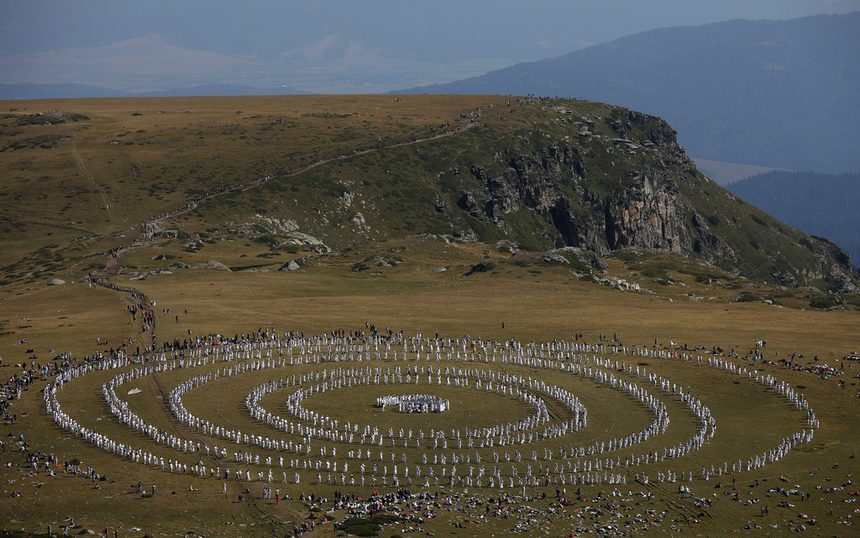Yesterday I wrote that Bulgarians tend to believe in miracle-makers. But I didn’t say why. Actually Bulgaria is the land of esotericism. Any attempt to explain Bulgarian politics needs a reference to the national mysticism.
Bulgaria held its main events during its Presidency of the Council of the EU (first half of 2018) in the National Palace of. Few realised that this mega-building, which opened its doors in 1981, was named after Lyudmila Zhivkova, the daughter of Todor Zhivkov, who ruled Bulgaria with an iron fist from 1956 to 1989.
Zhivkova was a phenomenon in Bulgarian recent history. The influential daughter of the country’s strongman broke all the rules by openly developing her interests in religious mysticism and the occult. But she was also a powerful promoter of the Bulgarian cultural identity, especially in her capacity as Minister of Culture, since 1975 until her death in 1981.
1981 was the year of the 1300th anniversary of the Bulgarian state, founded by Khan Asparuh. At that time, for a small country as Bulgaria, to claim ancient historic roots was seen as an offense in Moscow. A group of prominent Bulgarian intellectuals gathered around Zhivkova and pushed through an ambitious project to celebrate the anniversary by investing in culture and informing the nation of its proud history.
For the Soviet Union, such policy was seen not only as offensive, but close to betrayal. But it was very difficult for them to stop the developments, as it was Zhivkov’s daughter who was in the lead.
Lyudmila Zhivkova died on 21 July 1981 under unclear circumstances and the popular saying is that the KGB took her life. The Palace of Culture opened in 1981 and it was only natural that it was named after her.
Mysticism is not new in Bulgarian politics. King Boris the Third of Bulgaria, who reigned from 1918 until his death in 1943, was a devout follower of Peter Deunov, also known by his spiritual name Beins Douno, a Bulgarian philosopher and spiritual teacher who developed a form of esoteric Christianity.
During Zhivov’s long reign, millions were spent on a hyper-secret project, popularly known as the Tsaritchina hole (30 km north-west of Sofia). The working assumption was that an alien civilization had left a treasure trove of riches and wisdom, which would transform Bulgaria into the world’s leading nation.
The Tsarichina hole, as well as many other beliefs, are linked to the personality of Baba Vanga, a blind mystic and clairvoyant (1911-1996). Her legend fascinates many, because she had been capable of helping on a personal level tens of thousands of people who sought her advice.
In my family too, there is a least one case when Baba Vanga solved a mystery. In the 1950s, a grand uncle of mine was responsible for some public money in the city of Blagoevgrad that was stolen. Vanga revealed where the money was buried, which prevented my relative from committing suicide. I mention this personal story, because many Bulgarian families have similar experiences. There is a cult around Vanga which goes beyond Bulgaria.
Boyko Borissov, today’s Bulgarian strongman is known to have at least two astrologers, one being Svetoslav Spassov, a Vienna-based Bulgarian diplomat, and the other, Ekaterina Zaharieva, the minister for foreign affairs.
In September 2017 Borissov delayed the announcement of the candidate from his political force GERB until after the presidential elections, upon the advice of his astrologer Zaharieva, as he personally confessed himself. However, this did not prevent him from losing the election.
More seriously speaking, the Bogomils in the 10th century were a Christian sect believing in dualism – the soul created by God and the flesh created by the devil – that has spread its influence in terms of geography (the Cathars in France, but also in Italy, Spain.). Their rites such as fasting or superstitions are deeply entrenched in modern Bulgarian society.
There are many pagan rites Bulgarians profess as if they were part of their Christian culture and faith. The followers of the Bogomils refused to work in serfdom, to fight in conquering wars, or to pay taxes. This is all very Bulgarian, possibly the essence of our national spirit.
Georgi Gotev

